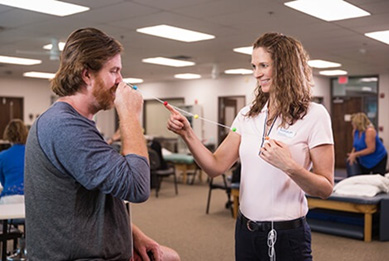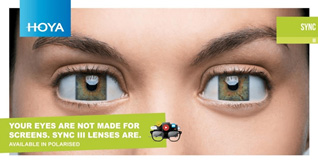Concussion and Vision: What You Need to Know


The long-term implications of concussion have been in the news a bit lately, connected with playing rugby. While concussions (especially repeat concussions) have a number of serious effects, one of them can be on vision.
As optometrists, we occasionally meet patients who are suffering from concussion symptoms and related vision problems. These are often young people who play sports, but not exclusively. We thought it was important for us to share what we know about concussion and vision, and how you can mitigate the long-term problems.
What can concussion do to vision?
- Blurry vision
- Headaches
- Double vision
- The vision in one eye coming and going (or just going)
- Clumsiness and poor hand-eye coordination
- Difficulty driving or taking stairs.
How your optometrist can help with concussion symptoms?
 Sometimes vision problems related to concussion will go away on their own, within a couple of weeks of the injury. Sometimes they stabilise and don’t get any worse, but don’t necessarily get any better. Sometimes they get worse.
Total rest is usually prescribed for a period after a concussion. That means no reading, watching TV or other electronic devices, and little social interaction. The fewer stimuli the brain receives, the better it will be able to heal.
If six weeks has passed since your injury and your concussion symptoms haven’t improved or are getting worse, it’s time to seek professional help and concussion therapy.
Because vision problems related to concussion are usually down to a brain rather than an eye injury, it’s important to receive therapy to treat the root of the problem. There may not be anything wrong with each eye’s individual sight (that is, you may not need any changes to your prescription, if you have one), but you may still be experiencing overall vision problems. Treating concussion-related vision problems isn’t the same as getting tested for glasses.
As optometrists, we can provide such therapy in various ways, which usually involve a couple of approaches: concussion therapy in the form of eye exercises, or some type of tinted or correcting lenses. The most appropriate treatment will depend on what your problem is.
If you’re experiencing light sensitivity, tinted glasses can help. Other problems can be treated with spectacle lenses that can prescribed specifically prescribed to alleviating eye strain.
Concussion therapy involving eye exercises aiims to retrain the visual system to eliminate problems with depth perception, balance and reading, among other symptoms. Patients who need vision therapy usually respond well to it.
Sometimes vision problems related to concussion will go away on their own, within a couple of weeks of the injury. Sometimes they stabilise and don’t get any worse, but don’t necessarily get any better. Sometimes they get worse.
Total rest is usually prescribed for a period after a concussion. That means no reading, watching TV or other electronic devices, and little social interaction. The fewer stimuli the brain receives, the better it will be able to heal.
If six weeks has passed since your injury and your concussion symptoms haven’t improved or are getting worse, it’s time to seek professional help and concussion therapy.
Because vision problems related to concussion are usually down to a brain rather than an eye injury, it’s important to receive therapy to treat the root of the problem. There may not be anything wrong with each eye’s individual sight (that is, you may not need any changes to your prescription, if you have one), but you may still be experiencing overall vision problems. Treating concussion-related vision problems isn’t the same as getting tested for glasses.
As optometrists, we can provide such therapy in various ways, which usually involve a couple of approaches: concussion therapy in the form of eye exercises, or some type of tinted or correcting lenses. The most appropriate treatment will depend on what your problem is.
If you’re experiencing light sensitivity, tinted glasses can help. Other problems can be treated with spectacle lenses that can prescribed specifically prescribed to alleviating eye strain.
Concussion therapy involving eye exercises aiims to retrain the visual system to eliminate problems with depth perception, balance and reading, among other symptoms. Patients who need vision therapy usually respond well to it.
Introducing HOYA Sync III lenses
 One tool that we can use to rectify vision after concussion is HOYA’s Sync III lenses. These advanced, single-vision lenses are designed for people who regularly use screens and are experiencing eye strain as a result. They are also useful for some types of concussion-related vision problems.
One tool that we can use to rectify vision after concussion is HOYA’s Sync III lenses. These advanced, single-vision lenses are designed for people who regularly use screens and are experiencing eye strain as a result. They are also useful for some types of concussion-related vision problems.
If you’ve experienced a concussion (or your child or someone in your family has) and would like to discuss your concussion therapy options, come and see us at Greenlane Penrose Optometrist.
Featured Posts
Glaucoma treatment — the silent thief of sight
by Jenny Glaucoma treatment -- more than tunnel visionAs the leading cause of preventable blindness in New Zealand, glaucoma is a group of diseases that damage the eye’s optic nerve and can result in vision loss and blindness. However, with early detection...
Peeps – a revolutionary lens cleaner
by Jenny The safest and most tested lens cleaning technology in the world - Peeps Greenlane Penrose is excited to offer the newest advancement in lens care, an all-in-one lens cleaner for all glasses.PEEPS FEATURES:Developed to clean eyewear and...
Address
Cnr Great South Road & Rockfield Road, Greenlane 1051
Phone
09 525 1516
Hours
Mon to Fri: 9am – 5pm
Sat to Sun: Closed
Holidays: Closed


